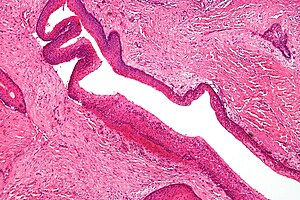Difference between revisions of "Odontogenic keratocyst"
Jump to navigation
Jump to search
(update) |
|||
| Line 39: | Line 39: | ||
| rosaicollection = 14023 | | rosaicollection = 14023 | ||
}} | }} | ||
'''Odontogenic keratocyst''', abbreviated '''OKC''' , is an uncommon [[Odontogenic tumours and cysts|odontogenic cyst]]. | '''Odontogenic keratocyst''', abbreviated '''OKC''', is an uncommon [[Odontogenic tumours and cysts|odontogenic cyst]]. | ||
It was | It was known as '''keratocystic odontogenic tumour''', abbreviated '''KOT''', from 2005 to 2017.<ref name=pmid18353202>{{Cite journal | last1 = Madras | first1 = J. | last2 = Lapointe | first2 = H. | title = Keratocystic odontogenic tumour: reclassification of the odontogenic keratocyst from cyst to tumour. | journal = J Can Dent Assoc | volume = 74 | issue = 2 | pages = 165-165h | month = Mar | year = 2008 | doi = | PMID = 18353202 }}</ref><ref name="isbn_978-92-832-2438-9">{{Citation |editor-last=El-Naggar |editor-first=Adel K |editor-last2=Chan |editor-first2=John KC |editor-last3=Grandis |editor-first3=Jennifer R |editor-last4=Takata |editor-first4=Takashi |editor-last5=Slootweg |editor-first5=Pieter J |year=2017 |title=WHO Classification of Head and Neck Tumours |edition= 4th |volume=9 |series=WHO/IARC Classification of Tumours |publisher=IARC Press |location=Lyon, France |url=http://publications.iarc.fr/Book-And-Report-Series/Who-Iarc-Classification-Of-Tumours/Who-Classification-Of-Head-And-Neck-Tumours-2017 |isbn=978-92-832-2438-9 |oclc= |lccn= |postscript=.}}</ref> | ||
==General== | ==General== | ||
*May be associated with ''[[nevoid basal cell carcinoma syndrome]]''. | *May be associated with ''[[nevoid basal cell carcinoma syndrome]]''. | ||
Revision as of 17:28, 18 March 2019
| Odontogenic keratocyst | |
|---|---|
| Diagnosis in short | |
 Keratocystic odontogenic tumour. H&E stain. | |
|
| |
| Synonyms | odontogenic keratocyst (old term) |
|
| |
| LM | stratified epithelium with "ribbon-like appearance" with palisaded basal cell layer, parakeratosis, artefactual separation of epithelium from the basement membrane |
| LM DDx | odontogenic cyst (dentigerous cyst), squamous cell carcinoma |
| Site | usually mandible - see odontogenic tumours and cysts |
|
| |
| Syndromes | nevoid basal cell carcinoma syndrome |
|
| |
| Signs | mass lesion |
| Prevalence | uncommon |
| Clin. DDx | ameloblastoma |
| Odontogenic keratocyst | |
|---|---|
| External resources | |
| EHVSC | 10179 10178 |
| Wikipedia | keratocystic odontogenic tumour |
| Pathology Outlines | topic/mandiblemaxillakeratocyst |
| Rosai Collection | 14023 |
Odontogenic keratocyst, abbreviated OKC, is an uncommon odontogenic cyst.
It was known as keratocystic odontogenic tumour, abbreviated KOT, from 2005 to 2017.[1][2]
General
- May be associated with nevoid basal cell carcinoma syndrome.
- Very rarely transforms to a squamous cell carcinoma.[3][4]
Clinical
Features:[5]
- Most common presentation: swelling.
Gross
- Location: usually mandible.
- May mimic ameloblastoma radiologically.
Microscopic
Features: [6]
- Stratified epithelium (resembling squamous epithelium) with:
- "Ribbon-like appearance" - important.
- Typically 8-10 cell layers thick - with relatively uniform thickness.
- Lacks rete ridges.
- Palisaded basal cell layer.
- "Ribbon-like appearance" - important.
- Parakeratosis (keratinized cells with nuclei) - key feature.
- Artefactual separation of epithelium from the basement membrane.
DDx:
- Odontogenic cyst.
- Orthokeratinized odontogenic cyst[7] - usu. dentigerous cyst - has orthokeratosis instead of parakeratosis.
- Orthokeratosis = keratinized cells no nuclei; parakeratosis = keratinized cell with nuclei.
- Orthokeratinized odontogenic cyst[7] - usu. dentigerous cyst - has orthokeratosis instead of parakeratosis.
Images
www:
See also
References
- ↑ Madras, J.; Lapointe, H. (Mar 2008). "Keratocystic odontogenic tumour: reclassification of the odontogenic keratocyst from cyst to tumour.". J Can Dent Assoc 74 (2): 165-165h. PMID 18353202.
- ↑ El-Naggar, Adel K, ed. (2017), WHO Classification of Head and Neck Tumours, WHO/IARC Classification of Tumours, 9 (4th ed.), Lyon, France: IARC Press, ISBN 978-92-832-2438-9, http://publications.iarc.fr/Book-And-Report-Series/Who-Iarc-Classification-Of-Tumours/Who-Classification-Of-Head-And-Neck-Tumours-2017.
- ↑ Lee, JW.; Gates, R.; Wignall, A. (Aug 2011). "Squamous cell carcinoma arising from a keratocystic odontogenic tumor.". Otolaryngol Head Neck Surg 145 (2): 356-7. doi:10.1177/0194599811399270. PMID 21493332.
- ↑ Tan, B.; Yan, TS.; Shermin, L.; Teck, KC.; Yoke, PC.; Goh, C.; Balakrishnan, A.. "Malignant transformation of keratocystic odontogenic tumor: Two case reports.". Am J Otolaryngol 34 (4): 357-61. doi:10.1016/j.amjoto.2013.01.002. PMID 23374486.
- ↑ Habibi, A.; Saghravanian, N.; Habibi, M.; Mellati, E.; Habibi, M. (Sep 2007). "Keratocystic odontogenic tumor: a 10-year retrospective study of 83 cases in an Iranian population.". J Oral Sci 49 (3): 229-35. PMID 17928730.
- ↑ Thompson LDR. Head and neck pathology - (Foundations in diagnostic pathology). Goldblum JR, Ed.. Churchill Livingstone. 2006. ISBN 0-443-06960-3.
- ↑ Macdonald-Jankowski, DS. (Dec 2010). "Orthokeratinized odontogenic cyst: a systematic review.". Dentomaxillofac Radiol 39 (8): 455-67. doi:10.1259/dmfr/19728573.
- ↑ URL: http://www.sciencedirect.com/science/article/pii/S0968605305000992#fig5. Accessed on: 11 March 2013.



